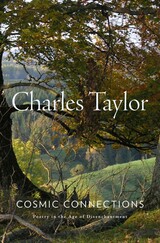
A major new work by Charles Taylor: the long-awaited follow-up to The Language Animal, exploring the Romantic poetics central to his theory of language.
The Language Animal, Charles Taylor’s 2016 account of human linguistic capacity, was a revelation, toppling scholarly conventions and illuminating our most fundamental selves. But, as Taylor noted in that work, there was much more to be said. Cosmic Connections continues Taylor’s exploration of Romantic and post-Romantic responses to disenchantment and innovations in language.
Reacting to the fall of cosmic orders that were at once metaphysical and moral, the Romantics used the symbols and music of poetry to recover contact with reality beyond fragmented existence. They sought to overcome disenchantment and groped toward a new meaning of life. Their accomplishments have been extended by post-Romantic generations into the present day. Taylor’s magisterial work takes us from Hölderlin, Novalis, Keats, and Shelley to Hopkins, Rilke, Baudelaire, and Mallarmé, and on to Eliot, Miłosz, and beyond.
In seeking deeper understanding and a different orientation to life, the language of poetry is not merely a pleasurable presentation of doctrines already elaborated elsewhere. Rather, Taylor insists, poetry persuades us through the experience of connection. The resulting conviction is very different from that gained through the force of argument. By its very nature, poetry’s reasoning will often be incomplete, tentative, and enigmatic. But at the same time, its insight is too moving—too obviously true—to be ignored.
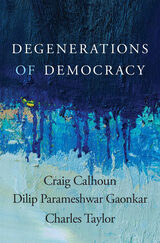
Three leading thinkers analyze the erosion of democracy’s social foundations and call for a movement to reduce inequality, strengthen inclusive solidarity, empower citizens, and reclaim pursuit of the public good.
Democracy is in trouble. Populism is a common scapegoat but not the root cause. More basic are social and economic transformations eroding the foundations of democracy, ruling elites trying to lock in their own privilege, and cultural perversions like making individualistic freedom the enemy of democracy’s other crucial ideals of equality and solidarity. In Degenerations of Democracy three of our most prominent intellectuals investigate democracy gone awry, locate our points of fracture, and suggest paths to democratic renewal.
In Charles Taylor’s phrase, democracy is a process, not an end state. Taylor documents creeping disempowerment of citizens, failures of inclusion, and widespread efforts to suppress democratic participation, and he calls for renewing community. Craig Calhoun explores the impact of disruption, inequality, and transformation in democracy’s social foundations. He reminds us that democracies depend on republican constitutions as well as popular will, and that solidarity and voice must be achieved at large scales as well as locally.
Taylor and Calhoun together examine how ideals like meritocracy and authenticity have become problems for equality and solidarity, the need for stronger articulation of the idea of public good, and the challenges of thinking big without always thinking centralization.
Dilip Parameshwar Gaonkar points out that even well-designed institutions will not integrate everyone, and inequality and precarity make matters worse. He calls for democracies to be prepared for violence and disorder at their margins—and to treat them with justice, not oppression.
The authors call for bold action building on projects like Black Lives Matter and the Green New Deal. Policy is not enough to save democracy; it will take movements.
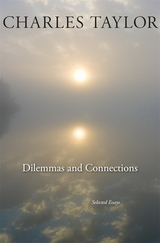
There are, always, more things in heaven and earth than are dreamt of in one’s philosophy—and in these essays Charles Taylor turns to those things not fully imagined or avenues not wholly explored in his epochal A Secular Age. Here Taylor talks in detail about thinkers who are his allies and interlocutors, such as Iris Murdoch, Alasdair MacIntyre, Robert Brandom, and Paul Celan. He offers major contributions to social theory, expanding on the issues of nationalism, democratic exclusionism, religious mobilizations, and modernity. And he delves even more deeply into themes taken up in A Secular Age: the continuity of religion from the past into the future; the nature of the secular; the folly of hoping to live by “reason alone”; and the perils of moralism. He also speculates on how irrationality emerges from the heart of rationality itself, and why violence breaks out again and again.
In A Secular Age, Taylor more evidently foregrounded his Catholic faith, and there are several essays here that further explore that faith. Overall, this is a hopeful book, showing how, while acknowledging the force of religion and the persistence of violence and folly, we nonetheless have the power to move forward once we have given up the brittle pretensions of a narrow rationalism.
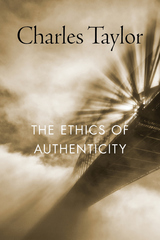
Everywhere we hear talk of decline, of a world that was better once, maybe fifty years ago, maybe centuries ago, but certainly before modernity drew us along its dubious path. While some lament the slide of Western culture into relativism and nihilism and others celebrate the trend as a liberating sort of progress, Charles Taylor calls on us to face the moral and political crises of our time, and to make the most of modernity’s challenges.
“The great merit of Taylor’s brief, non-technical, powerful book…is the vigor with which he restates the point which Hegel (and later Dewey) urged against Rousseau and Kant: that we are only individuals in so far as we are social…Being authentic, being faithful to ourselves, is being faithful to something which was produced in collaboration with a lot of other people…The core of Taylor’s argument is a vigorous and entirely successful criticism of two intertwined bad ideas: that you are wonderful just because you are you, and that ‘respect for difference’ requires you to respect every human being, and every human culture—no matter how vicious or stupid.”
—Richard Rorty, London Review of Books
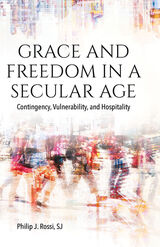

How Jesuit education can help students create meaningful connections in an age of secularism
In A Secular Age, the philosopher Charles Taylor challenges us to appreciate the significance of genuine spiritual experience in human life, an occurrence he refers to as “fullness.” Western societies, however, are increasingly becoming more secular, and personal occasions of fullness are becoming less possible.
In Jesuit Higher Education in a Secular Age, Daniel S. Hendrickson, SJ, shows how Jesuit education can respond to the crisis of modernity by offering three pedagogies of fullness: study, solidarity, and grace. A pedagogy of study encourages students to explore their full range of thoughts and emotions to help amplify their self-awareness, while a pedagogy of solidarity helps them relate to the lives of others, including disparate cultural and socioeconomic realities. Together, these two pedagogies cultivate an openness in students that can help them achieve a pedagogy of grace, which validates their awareness of and receptivity to the extraordinary spiritual Other that impacts our lives.
Hendrickson demonstrates how this Jesuit imaginary—inspired by the Renaissance humanistic origins of Jesuit pedagogy—educates students toward a better self-awareness, a stronger sense of global solidarity, and a greater aptitude for inspiration, awe, and gratitude.
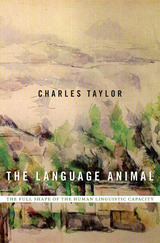
In seminal works ranging from Sources of the Self to A Secular Age, Charles Taylor has shown how we create possible ways of being, both as individuals and as a society. In his new book setting forth decades of thought, he demonstrates that language is at the center of this generative process.
For centuries, philosophers have been divided on the nature of language. Those in the rational empiricist tradition—Hobbes, Locke, Condillac, and their heirs—assert that language is a tool that human beings developed to encode and communicate information. In The Language Animal, Taylor explains that this view neglects the crucial role language plays in shaping the very thought it purports to express. Language does not merely describe; it constitutes meaning and fundamentally shapes human experience. The human linguistic capacity is not something we innately possess. We first learn language from others, and, inducted into the shared practice of speech, our individual selves emerge out of the conversation.
Taylor expands the thinking of the German Romantics Hamann, Herder, and Humboldt into a theory of linguistic holism. Language is intellectual, but it is also enacted in artistic portrayals, gestures, tones of voice, metaphors, and the shifts of emphasis and attitude that accompany speech. Human language recognizes no boundary between mind and body. In illuminating the full capacity of “the language animal,” Taylor sheds light on the very question of what it is to be a human being.
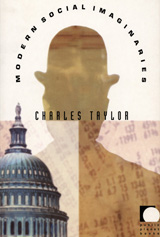
Retelling the history of Western modernity, Taylor traces the development of a distinct social imaginary. Animated by the idea of a moral order based on the mutual benefit of equal participants, the Western social imaginary is characterized by three key cultural forms—the economy, the public sphere, and self-governance. Taylor’s account of these cultural formations provides a fresh perspective on how to read the specifics of Western modernity: how we came to imagine society primarily as an economy for exchanging goods and services to promote mutual prosperity, how we began to imagine the public sphere as a metaphorical place for deliberation and discussion among strangers on issues of mutual concern, and how we invented the idea of a self-governing people capable of secular “founding” acts without recourse to transcendent principles. Accessible in length and style, Modern Social Imaginaries offers a clear and concise framework for understanding the structure of modern life in the West and the different forms modernity has taken around the world.
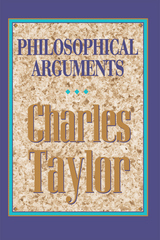
Charles Taylor is one of the most important English-language philosophers at work today; he is also unique in the philosophical community in applying his ideas on language and epistemology to social theory and political problems. In this book Taylor brings together some of his best essays, including "Overcoming Epistemology," "The Validity of Transcendental Argument," "Irreducibly Social Goods," and "The Politics of Recognition." As usual, his arguments are trenchant, straddling the length and breadth of contemporary philosophy and public discourse.
The strongest theme running through the book is Taylor's critique of disengagement, instrumental reason, and atomism: that individual instances of knowledge, judgment, discourse, or action cannot be intelligible in abstraction from the outside world. By developing his arguments about the importance of "engaged agency," Taylor simultaneously addresses themes in philosophical debate and in a broader discourse of political theory and cultural studies. The thirteen essays in this collection reflect most of the concerns with which he has been involved throughout his career--language, ideas of the self, political participation, the nature of modernity. His intellectual range is extraordinary, as is his ability to clarify what is at stake in difficult philosophical disputes. Taylor's analyses of liberal democracy, welfare economics, and multiculturalism have real political significance, and his voice is distinctive and wise.
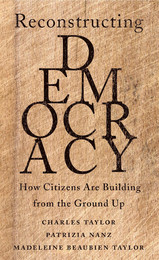
“An urgent manifesto for the reconstruction of democratic belonging in our troubled times.”
—Davide Panagia
Across the world, democracies are suffering from a disconnect between the people and political elites. In communities where jobs and industry are scarce, many feel the government is incapable of understanding their needs or addressing their problems. The resulting frustration has fueled the success of destabilizing demagogues. To reverse this pattern and restore responsible government, we need to reinvigorate democracy at the local level. But what does that mean? Drawing on examples of successful community building in cities large and small, from a shrinking village in rural Austria to a neglected section of San Diego, Reconstructing Democracy makes a powerful case for re-engaging citizens. It highlights innovative grassroots projects and shows how local activists can form alliances and discover their own power to solve problems.
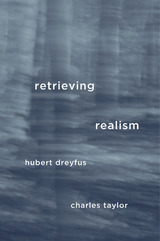
“A picture held us captive,” writes Wittgenstein in the Philosophical Investigations, describing the powerful image of mind that underlies the modern epistemological tradition from Descartes onward. Retrieving Realism offers a radical critique of the Cartesian epistemic picture that has captivated philosophy for too long and restores a realist view affirming our direct access to the everyday world and to the physical universe.
According to Descartes, knowledge exists in the form of ideas in the mind that purportedly represent the world. This “mediational” epistemology—internal ideas mediating external reality—continues to exert a grip on Western thought, and even philosophers such as Quine, Rorty, and Davidson who have claimed to refute Descartes remain imprisoned within its regime. As Hubert Dreyfus and Charles Taylor show, knowledge consists of much more than the explicit representations we formulate. We gain knowledge of the world through bodily engagement with it—by handling things, moving among them, responding to them—and these forms of knowing cannot be understood in mediational terms. Dreyfus and Taylor also contest Descartes’s privileging of the individual mind, arguing that much of our understanding of the world is necessarily shared.
Once we deconstruct Cartesian mediationalism, the problems that Hume, Kant, and many of our contemporaries still struggle with—trying to prove the existence of objects beyond our representations—fall away, as does the motivation for nonrealist doctrines. We can then begin to describe the background everyday world we are absorbed in and the universe of natural kinds discovered by science.
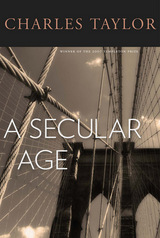
A New York Times Notable Book of the Year
A Times Literary Supplement Book of the Year
A Globe and Mail Best Book of the Year
A Publishers Weekly Best Book of the Year
A Tablet Best Book of the Year
Winner of a Christianity Today Book Award
“One finds big nuggets of insight, useful to almost anybody with an interest in the progress of human society.”
—The Economist
What does it mean to say that we live in a secular age? Almost everyone would agree that we—in the West, at least—largely do. And clearly the place of religion in our societies has changed profoundly in the last few centuries. In what will be a defining book for our time, Charles Taylor takes up the question of what these changes mean—of what, precisely, happens when a society in which it is virtually impossible not to believe in God becomes one in which faith, even for the staunchest believer, is only one human possibility among others.
Taylor, long one of our most insightful thinkers on such questions, offers a historical perspective. He examines the development in “Western Christendom” of those aspects of modernity which we call secular. What he describes is in fact not a single, continuous transformation, but a series of new departures, in which earlier forms of religious life have been dissolved or destabilized and new ones have been created. As we see here, today’s secular world is characterized not by an absence of religion—although in some societies religious belief and practice have markedly declined—but rather by the continuing multiplication of new options, religious, spiritual, and anti-religious, which individuals and groups seize on in order to make sense of their lives and give shape to their spiritual aspirations.
What this means for the world—including the new forms of collective religious life it encourages, with their tendency to a mass mobilization that breeds violence—is what Charles Taylor grapples with, in a book as timely as it is timeless.
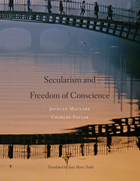
Secularism: the definition of this word is as practical and urgent as income inequalities or the paths to sustainable development. In this wide-ranging analysis, Jocelyn Maclure and Charles Taylor provide a clearly reasoned, articulate account of the two main principles of secularism—equal respect, and freedom of conscience—and its two operative modes—separation of Church (or mosque or temple) and State, and State neutrality vis-à-vis religions. But more crucially, they make the powerful argument that in our ever more religiously diverse, politically interconnected world, secularism, properly understood, may offer the only path to religious and philosophical freedom.
Secularism and Freedom of Conscience grew out of a very real problem—Quebec’s need for guidelines to balance the equal respect due to all citizens with the right to religious freedom. But the authors go further, rethinking secularism in light of other critical issues of our time. The relationship between religious beliefs and deeply-held secular convictions, the scope of the free exercise of religion, and the place of religion in the public sphere are aspects of the larger challenge Maclure and Taylor address: how to manage moral and religious diversity in a free society. Secularism, they show, is essential to any liberal democracy in which citizens adhere to a plurality of conceptions of what gives meaning and direction to human life. The working model the authors construct in this nuanced account is capacious enough to accommodate difference and freedom of conscience, while holding out hope for a world in which diversity no longer divides us.
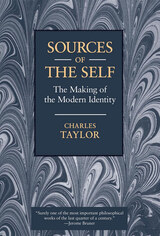
In this extensive inquiry into the sources of modern selfhood, Charles Taylor demonstrates just how rich and precious those resources are. The modern turn to subjectivity, with its attendant rejection of an objective order of reason, has led—it seems to many—to mere subjectivism at the mildest and to sheer nihilism at the worst. Many critics believe that the modern order has no moral backbone and has proved corrosive to all that might foster human good. Taylor rejects this view. He argues that, properly understood, our modern notion of the self provides a framework that more than compensates for the abandonment of substantive notions of rationality.
The major insight of Sources of the Self is that modern subjectivity, in all its epistemological, aesthetic, and political ramifications, has its roots in ideas of human good. After first arguing that contemporary philosophers have ignored how self and good connect, the author defines the modern identity by describing its genesis. His effort to uncover and map our moral sources leads to novel interpretations of most of the figures and movements in the modern tradition. Taylor shows that the modern turn inward is not disastrous but is in fact the result of our long efforts to define and reach the good. At the heart of this definition he finds what he calls the affirmation of ordinary life, a value which has decisively if not completely replaced an older conception of reason as connected to a hierarchy based on birth and wealth. In telling the story of a revolution whose proponents have been Augustine, Montaigne, Luther, and a host of others, Taylor’s goal is in part to make sure we do not lose sight of their goal and endanger all that has been achieved. Sources of the Self provides a decisive defense of the modern order and a sharp rebuff to its critics.
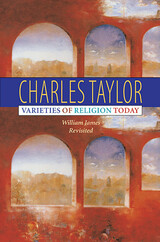
A hundred years after William James delivered the celebrated lectures that became The Varieties of Religious Experience, one of the foremost thinkers in the English-speaking world returns to the questions posed in James's masterpiece to clarify the circumstances and conditions of religion in our day. An elegant mix of the philosophy and sociology of religion, Charles Taylor's powerful book maintains a clear perspective on James's work in its historical and cultural contexts, while casting a new and revealing light upon the present.
Lucid, readable, and dense with ideas that promise to transform current debates about religion and secularism, Varieties of Religion Today is much more than a revisiting of James's classic. Rather, it places James's analysis of religious experience and the dilemmas of doubt and belief in an unfamiliar but illuminating context, namely the social horizon in which questions of religion come to be presented to individuals in the first place.
Taylor begins with questions about the way in which James conceives his subject, and shows how these questions arise out of different ways of understanding religion that confronted one another in James's time and continue to do so today. Evaluating James's treatment of the ethics of belief, he goes on to develop an innovative and provocative reading of the public and cultural conditions in which questions of belief or unbelief are perceived to be individual questions. What emerges is a remarkable and penetrating view of the relation between religion and social order and, ultimately, of what "religion" means.
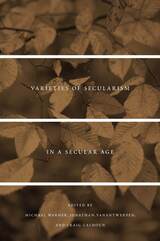
“What does it mean to say that we live in a secular age?” This apparently simple question opens into the massive, provocative, and complex A Secular Age, where Charles Taylor positions secularism as a defining feature of the modern world, not the mere absence of religion, and casts light on the experience of transcendence that scientistic explanations of the world tend to neglect.
In Varieties of Secularism in a Secular Age, a prominent and varied group of scholars chart the conversations in which A Secular Age intervenes and address wider questions of secularism and secularity. The distinguished contributors include Robert Bellah, José Casanova, Nilüfer Göle, William E. Connolly, Wendy Brown, Simon During, Colin Jager, Jon Butler, Jonathan Sheehan, Akeel Bilgrami, John Milbank, and Saba Mahmood.
Varieties of Secularism in a Secular Age succeeds in conveying to readers the complexity of secularism while serving as an invaluable guide to a landmark book.
READERS
Browse our collection.
PUBLISHERS
See BiblioVault's publisher services.
STUDENT SERVICES
Files for college accessibility offices.
UChicago Accessibility Resources
home | accessibility | search | about | contact us
BiblioVault ® 2001 - 2024
The University of Chicago Press









